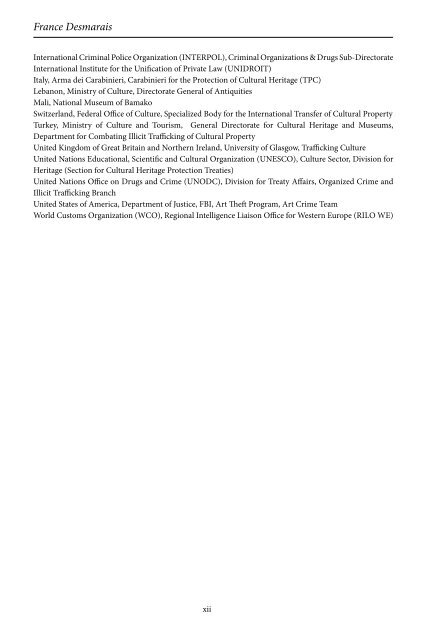Countering
Book_observatory_illicit_traffic_version%20issuu
Book_observatory_illicit_traffic_version%20issuu
You also want an ePaper? Increase the reach of your titles
YUMPU automatically turns print PDFs into web optimized ePapers that Google loves.
Günther Wessel<br />
Dealers and Collectors, Provenances and Rights:<br />
Searching for Traces<br />
In the summer of 2014, I wrote to several antiquities dealers in Germany to discuss the<br />
trade in archaeological finds, both legal and illegal. In my letter, I observed that ‘serious<br />
accusations – especially by archaeologists – are relentlessly levelled against the trade in<br />
antiquities and the dealers: a large proportion of the business is thought to be based on<br />
the sale of illicit objects from excavations. There is talk of handling stolen objects that<br />
have been looted, of indirect incitement to looting, obscured provenances, smuggling<br />
and exploitation of legal grey areas.’ Few were those who responded: just as most of the<br />
dealers ignored my enquiry – in one instance the answer came through his lawyer – so<br />
too did the auction houses remain utterly silent. The only person willing to talk to me<br />
was Ursula Kampmann.<br />
Ursula Kampmann is the spokesperson of the International Association of Dealers<br />
in Ancient Art (IADAA), an association of antiquities dealers from Europe and the<br />
U.S.A and, at the same time, a lobby organization founded in 1993. Quoted below is the<br />
opening sentence of the IADAA ‘statement’, which can be found online:<br />
IADAA stands firstly for the right of the trade, collectors and museums to legally acquire, own, sell<br />
and donate antiquities from the ancient world encompassed by the Mediterranean, Europe and the<br />
Near East.<br />
Ursula Kampmann’s enthusiasm for collecting is manifest as she evokes the fascination<br />
collectors nurture for history. ‘No journey back into the past could ever be so direct and<br />
concrete an experience as that of collecting,’ she says. But what is the provenance of the<br />
antiquities for sale in auction catalogues and proposed by art dealers? ‘Well,’ she explains,<br />
‘History makes clear that collecting is an old activity, for people have been collecting<br />
since the Middle Ages, but it was during the Renaissance that the occupation flourished.’<br />
She evokes the cultural exchanges between the Humanists, their unwavering curiosity<br />
for the past – a time when the first major collections of ancient art came into being. ‘The<br />
life of goldsmith and sculptor Benvenuto Cellini illustrates this passion well. He used<br />
to stand on the edge of Rome’s city walls, and intercept farmers who came in from their<br />
fields and would buy the objects they had found plowing. The greatest collectors had<br />
tens of thousands of objects in their collections.’ Is that where the antiquities come from?<br />
Michael Müller-Karpe, an archaeologist working at the Römisch-Germanisches<br />
Zentralmuseum in Mainz, shakes his head before such a discourse. ‘That is a some wornout<br />
fairytale,’ he says, admitting that old collections have indeed existed – “curiosities”<br />
seamlessly collected by aristocrats for hundreds of years. Müller-Karpe remarks, however,<br />
that the number of objects from such collections is negligible compared with what the<br />
market offers. Furthermore, he continues, insofar as these old pieces had been part of<br />
these collections for centuries, they had most likely been documented previously, and<br />
in many places: diaries, copper engravings for the earliest sources, newspaper articles or<br />
other types of publication in more recent times. ‘Unrecorded objects were deemed so<br />
worthless that heirs discarded them systematically,’ he explains.<br />
Glasgow archaeologist and crime researcher Neil Brodie observes that ‘only very,<br />
1


